Caspian Policy Center Hosts 5th Annual Business Forum in New York
Recent Articles
Author: Caspian Policy Center
09/25/2024
The Caspian Policy Center (CPC) held its fifth annual Caspian Business Forum on September 24 at New York City’s Harvard Club in partnership with the embassies of the nations of the Caspian Region. The event brought together key stakeholders from the United States and the region to discuss and strategize on the emerging business and energy landscape across the South Caucasus and Central Asia, with a focus on growing regional connectivity and the emerging COP 29 agenda.
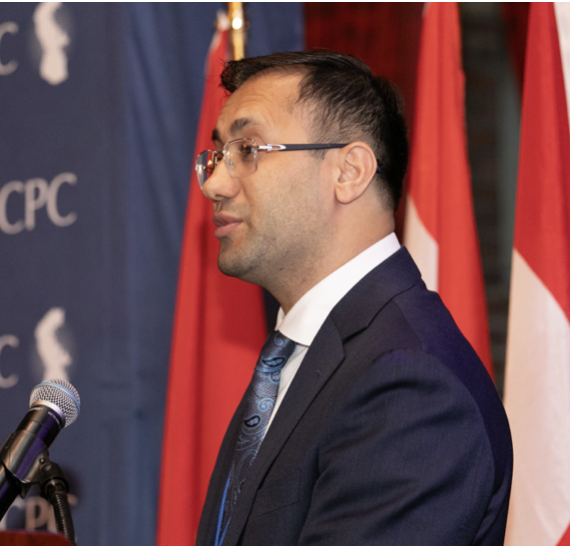
Photo of CPC President Efgan Nifti
Efgan Nifti, President of the Caspian Policy Center, gave opening remarks underlining the importance of the South Caucasus and Central Asia to world markets and supply chains. Nifti noted that, “Almost exactly a year ago, we reached a milestone with the first ever C5+1 meeting between Central Asian heads of state and President Joe Biden and U.S. officials and others have built on this momentum since. The United States, along with its G7 partners, have moved forward with the Partnership for Global Infrastructure and Investment (PGI), which has become a major source of foreign investment into our region, announcing in June nearly $600 million in loans to Kazakhstan’s national rail company, with more likely to come. This year, the European Union’s Global Gateway Initiative announced an investment package of 10 billion Euros for Central Asia, primarily aimed at transit infrastructure.”
The CPC President highlighted the growing importance of transport connectivity in the region through projects such as the Middle Corridor, as well as the Caspian region’s continued demonstration of its ability to provide energy to the world, whether in the form of hydrocarbons or renewable energy. Nifti addressed trends in the green energy transition, stating, "With Azerbaijan hosting the COP 29 conference this November, it is clearer than ever that the green energy transition will be crucial for the Caspian region in the coming years." He noted that these changes are driving increased regional cooperation and opening up lucrative business opportunities that were previously unimaginable.
KEYNOTE SPEAKERS
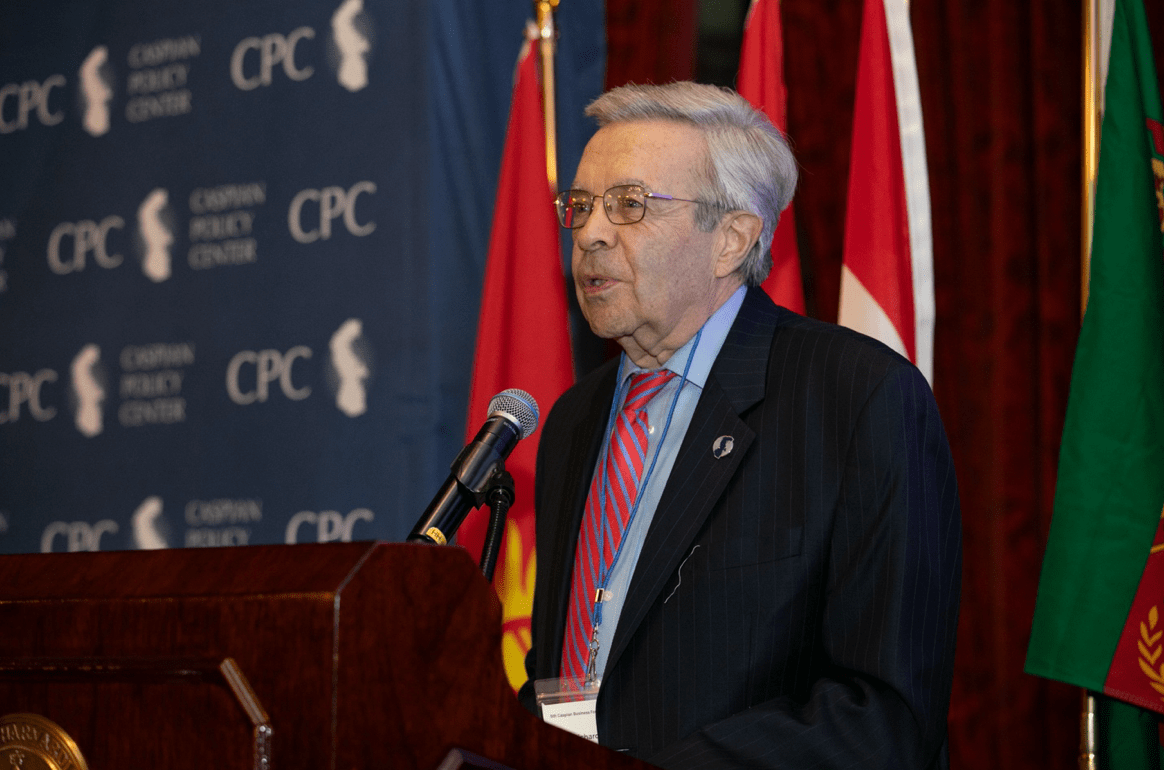 Photo of CPC Chairman of the Board of Directors Ambassador (ret.) Richard Hoagland
Photo of CPC Chairman of the Board of Directors Ambassador (ret.) Richard Hoagland
The CPC Chairman of the Board of Directors, Ambassador (ret.) Richard Hoagland, moderated the keynote-speaker session.
The first keynote speaker, Geoffrey Pyatt, is the U.S. State Department’s Assistant Secretary for Energy Resources.
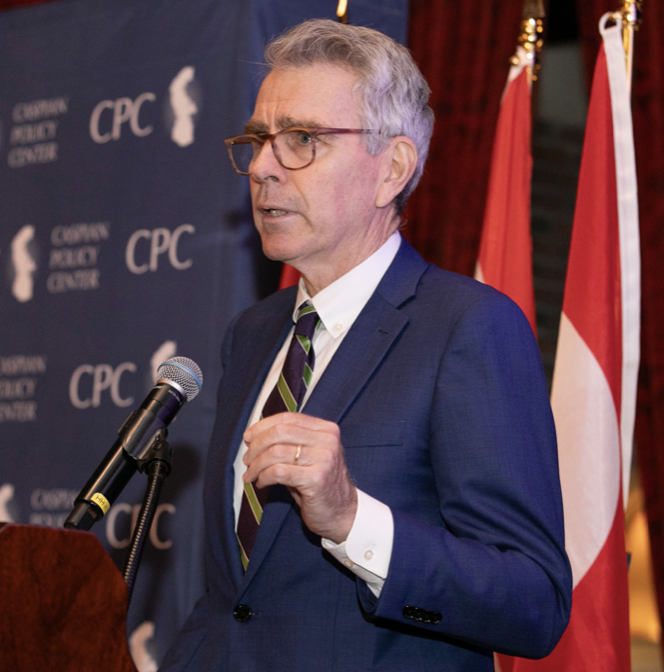
Photo of U.S. Assistant Secretary Geoffrey Pyatt
“The Caspian region is also directly impacted and has a front row seat on Russia's brutal and unprovoked invasion of Ukraine, and the incredible disruption that Russia’s weaponization on its energy resources has caused to global energy security,” Pyatt said. He highlighted the need for both interregional and intraregional cooperation in supplying the energy-rich Caspian region’s resources to world markets. “I’m acutely sensitive to the fact that the Caspian region and Central Asia have work still to do in terms of interconnections, both for gas, but also crucially for power, and especially in a world that’s seeing the rapid acceleration of investment in clean power.”
Thrilled to return to the @caspiancenter Caspian Business Forum to discuss the region’s growing role in global energy security and regional interconnections. Decarbonization & the energy transition will increase energy security and create economic opportunity. pic.twitter.com/bKXRlvdYV0
— Assistant Secretary Geoffrey Pyatt (@AsstSecENR) September 25, 2024
Pyatt also commented on the region’s heightened importance in regard to the green energy transition, “We’re giving a systematic focus to the Caspian region, with a particular spotlight on COP29, centered around decarbonization, methane abatement, and how to manage the fossil resources. We’re excited to see what can be accomplished at COP 29, especially in terms of trans-Caspian opportunities for clean hydro power, but also to see the way the Caspian region can transport clean energy far afield.”
Pyatt concluded by saying that, “We are very eager to do what we can as the United States to help your region build that energy security. Over two years now, I’ve been working directly with the leadership in KMG and SOCAR, and the governments of Kazakhstan and Azerbaijan on opportunities to diversify crude oil export routes. We’re also continuing decades of work by the USG on issues around Caspian gas supply. Caspian natural gas transported through SGC is already playing an absolutely critical role in ensuring the energy security of the EU. And the U.S. believes there is more we can do in this space.”
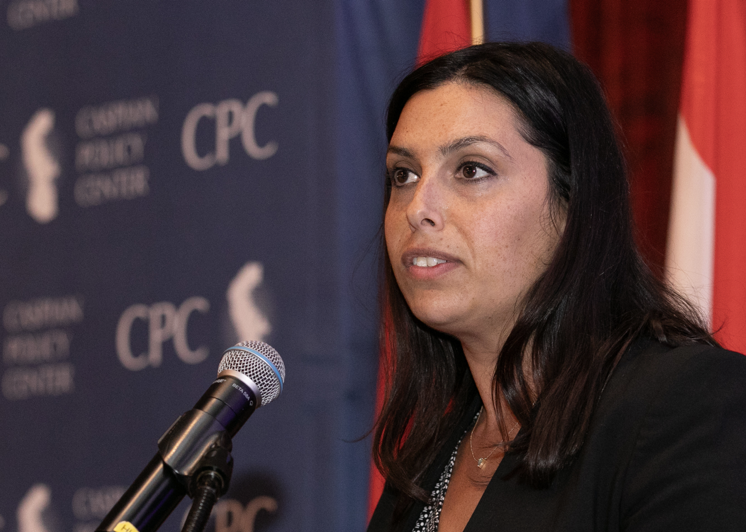
Photo of U.S. Acting Special PGI Coordinator Helaina Matza
The Forum’s second keynote address was provided by Helaina Matza, Acting Special Coordinator of the Office of the U.S. Special Coordinator for the Partnership for Global Infrastructure and Investment (PGI). Matza recognized increased U.S. engagement with Central Asian leaders over the past two years, which has been at a higher level than any time in the past 30-plus years of the Central Asian states’ independence. She spoke of the importance of Trans-Caspian trade for international markets, and what the United States has done to support its development. “We’ve seen governments and private partners across the Caspian region take initial steps to really invest in interconnectivity. Kazakhstan and Azerbaijan have committed to develop a Trans-Caspian fiber optic cable, which will be the first digital cable in the Caspian Sea that provides the needed resiliency for data flows currently dependent on terrestrial cables through Russia,” Matza stated.
Matza continued, “Our team is actively evaluating initial areas of investments, those range from rail to ports, digital, fiber and different distribution centers all across the region. We’re prepared to bring together the full U.S. government toolkit and the work that the Assistant Secretary [Pyatt] mentioned earlier about how we’re looking at investment across these really important supply chains.”
“We think continuing those efforts to double down and tackle those trade barriers and concrete action is what we want to continue going forward,” Matza added.
Yesterday at the #CaspianBusinessForum, @Matza22 discussed the U.S. commitment to the Trans-Caspian Corridor through PGI. pic.twitter.com/TWsg7fGt42
— US Partnership Global Infrastructure & Investment (@US_PGI) September 25, 2024
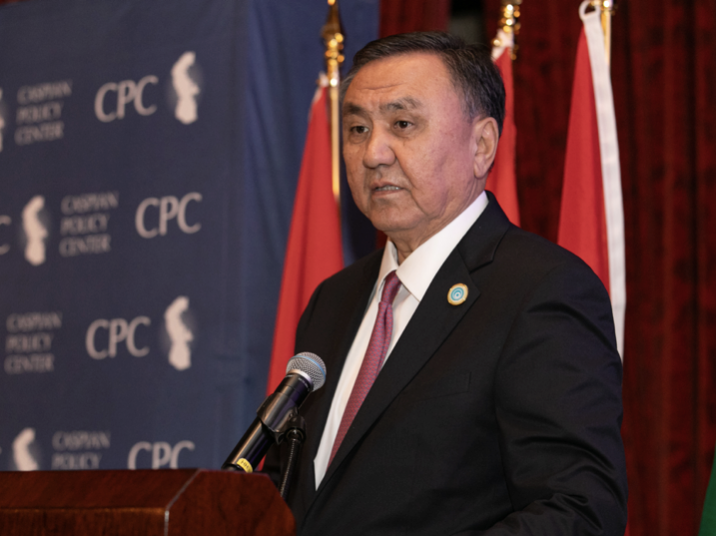
Photo of OTS Secretary General Kubanychbek Omuraliev
Ambassador Kubanychbek Omuraliev, Secretary-General, Organization of Turkic States (OTS), delivered the third keynote address. He highlighted the priority for OTS to maintain its momentum by contributing to the prosperity of the Turkic world and beyond through improved cooperation: “Through its policy frameworks ‘The Turkic World Vision 2040’ and the ‘OTS 2022-2026 Strategy,’ we have established an extensive economic program through ministerial agencies and institutions, supported by numerous cooperation mechanisms.”
Ambassador Omuraliev underscored the strategic importance of the Trans-Caspian International Corridor, also known as the Middle Corridor, which has begun yielding significant results. Noting this progress, Omuraliev added that, “Once operational, the China-Kyrgyzstan-Uzbekistan railway project, which is a cornerstone project of the Middle Corridor, will reduce the distance from East Asia to the countries of the Middle East and Southern Europe by around 900 kilometers.”
The OTS Secretary General also spoke on the green energy transition initiatives undertaken by his organization: “We are in the process of adopting the conceptual document titled Turkic Green Region Unity for a sustainable future in the upcoming OTS Summit in Bishkek next month, which aligns with Paris Climate Agreement.”
SECOND SESSION: CASPIAN REGION MINISTERIAL SPEAKERS
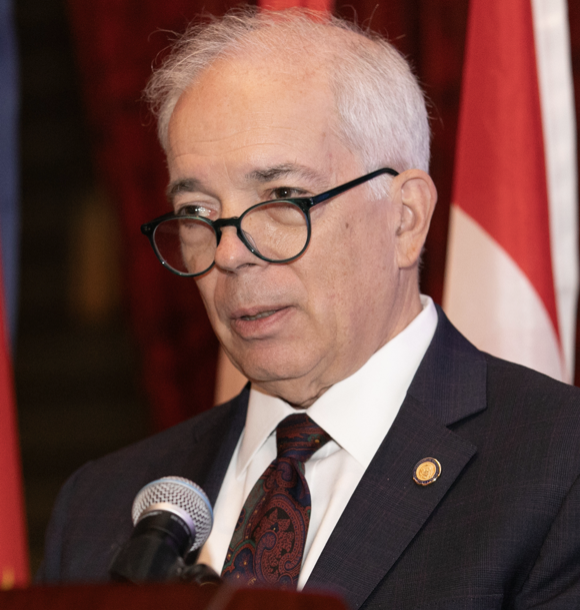
Photo of CPC Senior Adviser, Dr. Eric Rudenshiold
Dr. Eric Rudenshiold, Senior Fellow at the Caspian Policy Center, moderated the second session of the forum that featured senior officials from the Caspian Region.
Dr. Rudenshiold discussed the remarkable developments unfolding in the region, noting that, “The sleeping giant that is the Caspian region has been awakened.” Increased cooperation between countries in the region holds significant promise, commenting that peace between Armenia and Azerbaijan could enhance regional prosperity by more than doubling the Middle Corridor’s freight rail traffic.
“Increased Caspian connectivity is a genie that has escaped the bottle and will never go back,” Rudenshiold added. “What we see across the region now is the development of a common cultural space, regional identities, and regional innovation. Trans-Caspian countries are enjoying greater cooperation among themselves and with markets to the north, south, east and west—returning this region to its former crossroads status.”
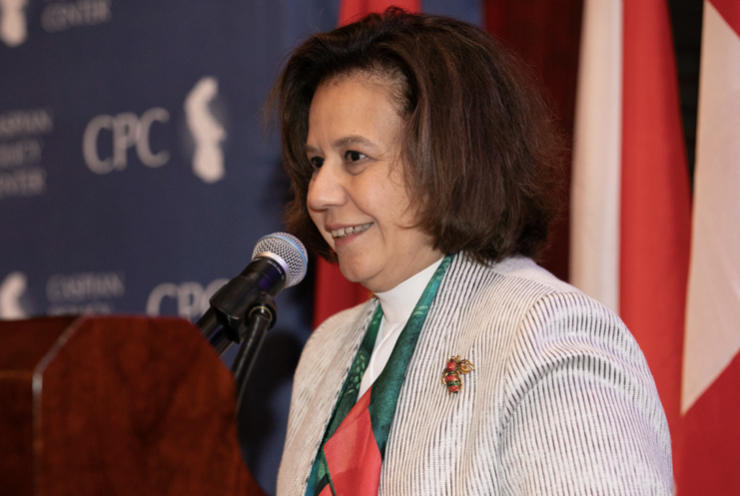
Photo of Türkiye’s Deputy Minister of Foreign Affairs Berris Ekinci
Berris Ekinci, Deputy Minister of Foreign Affairs of Türkiye, described the importance of Turkish-Caspian regional engagement. “Türkiye has always been a reliable energy partner and has been actively contributing to the energy security of this region through the use of it extensive energy infrastructure… We’re working very closely with Azerbaijan, Turkmenistan, Kazakhstan, and Georgia to doing more to tap into the rich energy resources of the region and make it available to consumer markets, both in Türkiye and in Europe,” she continued.
Ekinci also discussed the need for regional cooperation on common energy goals, noting that, “We need to seize this opportunity to bring new volumes of gas to the market. This window of opportunity will not be eternal, so we must act quickly.”
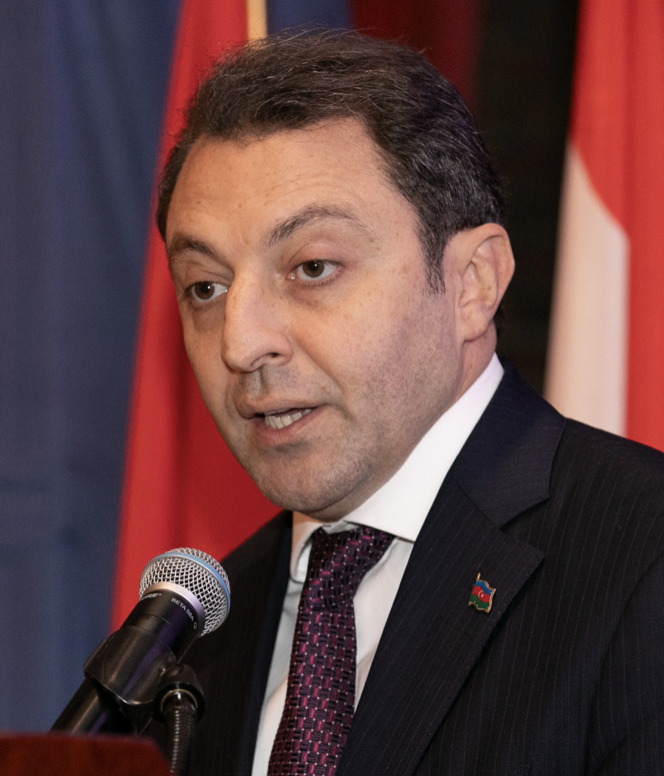
Photo of Deputy Foreign Minister of Azerbaijan Elnur Mammadov
To improve key barriers in energy transition, Azerbaijan’s Deputy Minister of Foreign Affairs, Elnur Mammadov, called on the Caspian region’s countries to continue working together in joint formats: “Initiatives such as the UN SPECA climate innovation dialogue launched under the framework of COP29 are designed to foster regional cooperation and innovation.”
Azerbaijan is also working to greatly expand its renewable energy capacity by constructing new transmission cables and new energy generation facilities. “One of the key barriers remaining is the development of critical infrastructure. Another challenge is the need for green financing to support the development of large-scale renewable projects. Azerbaijan remains dedicated to methane emissions reductions as part of our broader commitment to the global methane pledge.”, Mammadov stated.
“Azerbaijan is ready to lead the global community at COP29, building on our legacy as a key energy provider while increasing the future of sustainable development,” he added.
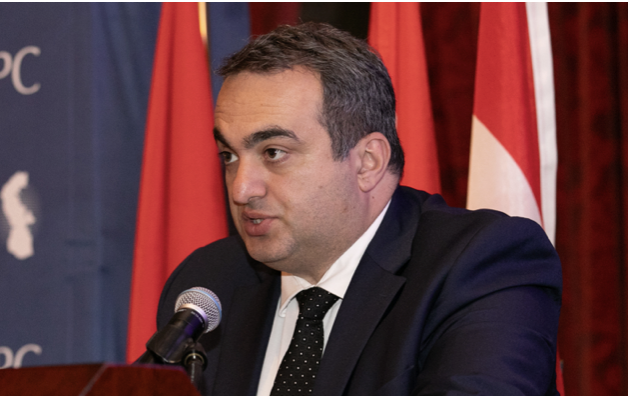
Photo of First Deputy Foreign Minister of Georgia Lasha Darsalia
Lasha Darsalia, First Deputy Minister of Foreign Affairs of Georgia, spoke on Georgia’s economic resilience and favorable business environment. He noted that, “Despite geopolitical tensions and a challenging external environment, the Georgian economy has demonstrated resilience and has overcome external shocks with a notable growth at 9.7% in the first half of 2024.”
Commenting on the supply disruptions caused by Russia’s war on Ukraine, Darsalia specifically pointed out Georgia’s growing role in facilitating greater energy and transport connectivity, “Georgia has been a key link in delivering Caspian hydrocarbon resources to Türkiye and Europe via key projects such as the Baku-Tbilisi-Ceyhan oil pipeline, the Baku-Tbilisi –Erzurum gas pipeline, and the Southern Gas Corridor.”
Noting the importance to his country for developing infrastructure connectivity, he added that, “The Middle Corridor enables route diversification with access to Turkish and Southeastern European markets, via Georgia. In this line, the Anaklia deep seaport remains a top priority project for the government of Georgia in order to increase its competitiveness as a maritime state.”
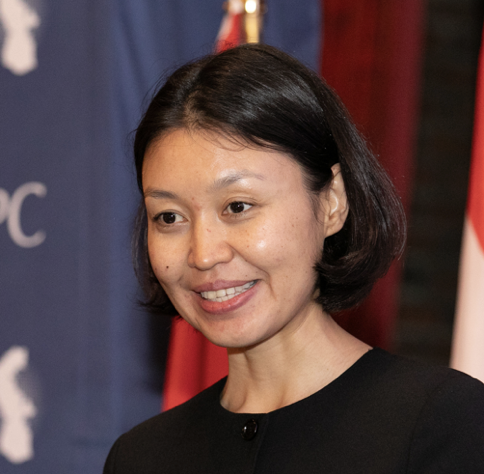
Photo of Adviser to Kazakhstan’s President Zulfiya Suleimenova
Zulfiya Suleimenova, Advisor to the President and Special Representative of the President of Kazakhstan on International Environmental Cooperation, also discussed the ongoing energy transition, namely her country’s efforts to reduce methane emissions. “Kazakhstan is the only country that has reduced the volume of gas flaring and flaring intensity by 70%,” Suleimenova stated.
She went on to highlight the importance of regional cooperation, as well as collaboration with partners such as the United States, “Through regional cooperation, partnerships with global leaders like the U.S., we can achieve resilience and sustainable progress… We expect that initiatives launched during the C5+1 Summit, such as the Critical Minerals Dialogue and the B5+1 Forum will translate into tangible projects that enhance the diversification and resilience of global trade routes,” Suleimenova added.
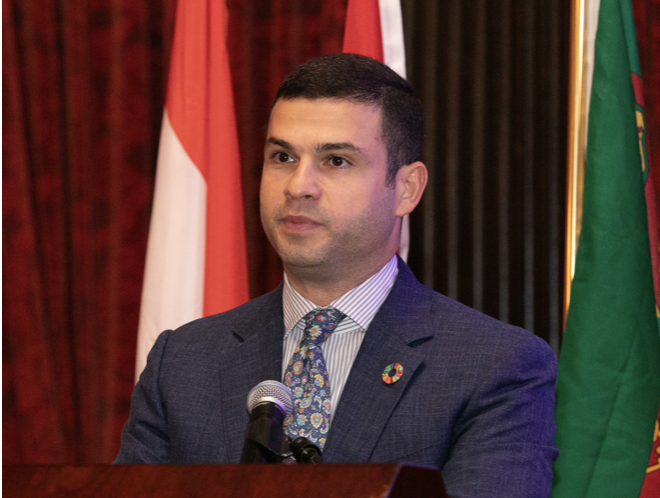
Photo of Chairman of the Small and Medium Business Development Agency’s Board Orkhan Mammadov
Orkhan Mammadov, Chairman of the Management Board, Small and Medium Business Development Agency of the Republic of Azerbaijan (KOBIA), highlighted successful business practices and opportunities in Azerbaijan. He specifically spoke on Azerbaijan’s recent success in creating a favorable framework for the development of small and medium-sized enterprises (SMEs), noting that, “Azerbaijan continues to offer a highly favorable business and investment environment: according to the latest report from IMF, Azerbaijan has been recognized as one of the top seven most attractive countries for investment globally.”
Mammadov also discussed opportunities to further improve the business environment in his country. “Liberation of the Karabakh region, a historically significant part of Azerbaijan, has created new opportunities for economic growth and investment. Reconstruction and redevelopment efforts in Karabakh have attracted a greater deal of interest from both local and foreign investors,” he noted.
He also touched on Azerbaijan’s green energy transformation, stating that, “Sustainability is no longer optional, it’s an essential part of staying competitive in today’s business environment. At KOBIA, we have made green transformation a key part of the strategy agenda.”
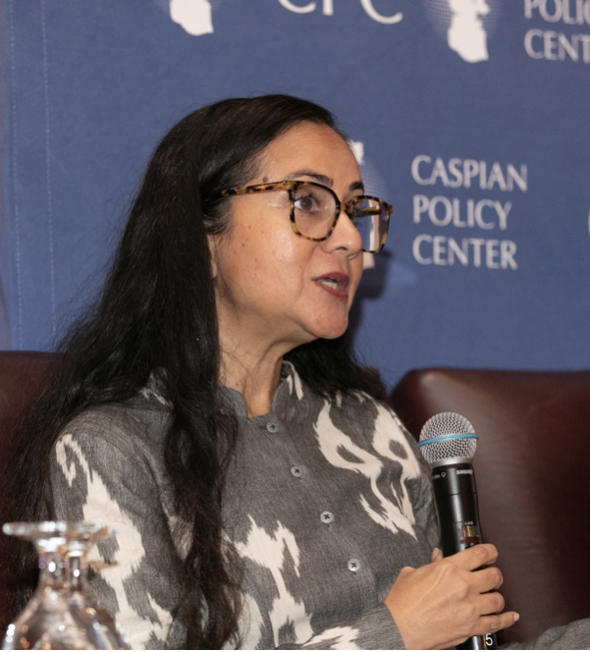
Photo of U.S. Deputy Assistant Administrator Anjali Kaur
USAID Deputy Assistant Administrator Änjali Kaur picked up on the importance of reducing energy costs and building energy resilience in the region. “We’re helping Central Asian countries establish a Central Asia regional electricity market, and the idea behind this is to increase energy trade and security across the region, making access to power more reliable and accessible.”
Kaur emphasized the emerging economic potential in the Caspian region as connectivity grows. “Since 2021, we’ve invested over 24 million USD to help harmonize customs and border procedures within the region, facilitate public-private dialogues on trade and investment, build relationships between firms across borders and support improvements to the Trans-Caspian Corridor,” she added. “As the region continues to connect its people to resources and grow its economic potential, we need now more than ever to safeguard the natural resources that support the millions of livelihoods.”
Yesterday, @USAID Deputy Asst. Administrator Kaur joined @Caspiancenter to highlight how USAID works w/ partners on sustainable development in Central Asia through investments in clean & renewable energy. #UNGA79 https://t.co/zHv1lbzMSj
— USAID Bureau for Asia (@USAIDAsiaHQ) September 25, 2024
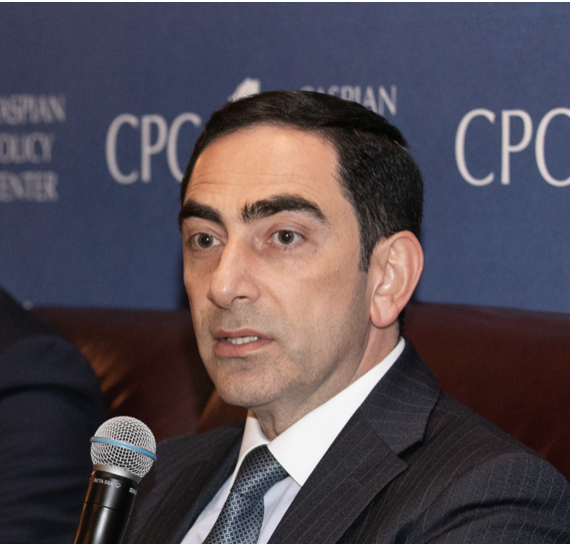
Photo of Director-General of the Baku International Sea Port Taleh Ziyadov
One of the largest issues is coordination between investors and the countries along the Middle Corridor. “The region is growing in importance and will continue to do so, but it’s obvious that there will be lots of competition for its resources. The importance of logistics is at the upfront of these, in light of the war in Ukraine,” said Dr. Taleh Ziyadov, Director-General of the Baku International Sea Trade Port. He then commented on the gradual transformation of transit infrastructure in the Caspian Region as a potential green trade route, “For the Middle Corridor to become sustainable, it has to transform itself into a green corridor. The Port of Baku has started this journey long ago, we are the first green eco-port in the region. I believe that all regional railways should switch to green sources of supply.”
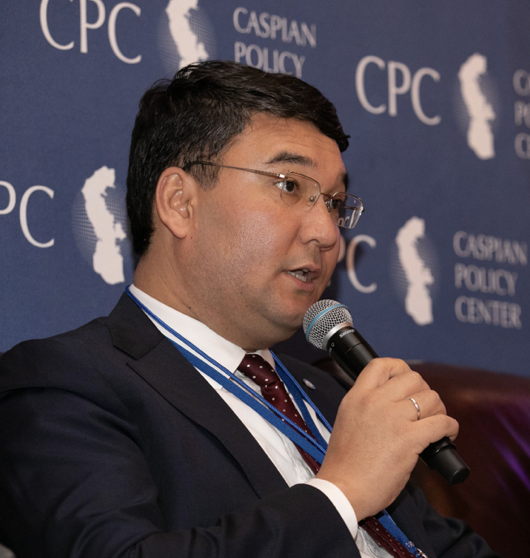
Photo of Kazakhstan’s Foreign Ministry Investment Committee Chairman Gabidulla Ospankulov
Gabidulla Ospankulov, Chairman of the Investment Committee of the Kazakh Ministry of Foreign Affairs, spoke on Kazakhstan’s strategic position in leading Central Asia to unlocking the region’s full potential. “As the fastest growing economy in Central Asia, Kazakhstan remains committed to its multi-vector foreign policy, maintaining balanced and productive relationships with global partners, including the U.S,” he said. Ospankulov also noted the growing global demand for critical minerals, stating that, “Kazakhstan ranks among the top 20 nations in reserves of chrome, zinc, lead, copper, gold, titanium, and other critical minerals, which presents another area of opportunity for the country.” He also added that Kazakhstan is shifting its investment strategy from “resource-seeking” to “efficiency-seeking,” focusing on innovation, digital infrastructure, and FinTech.
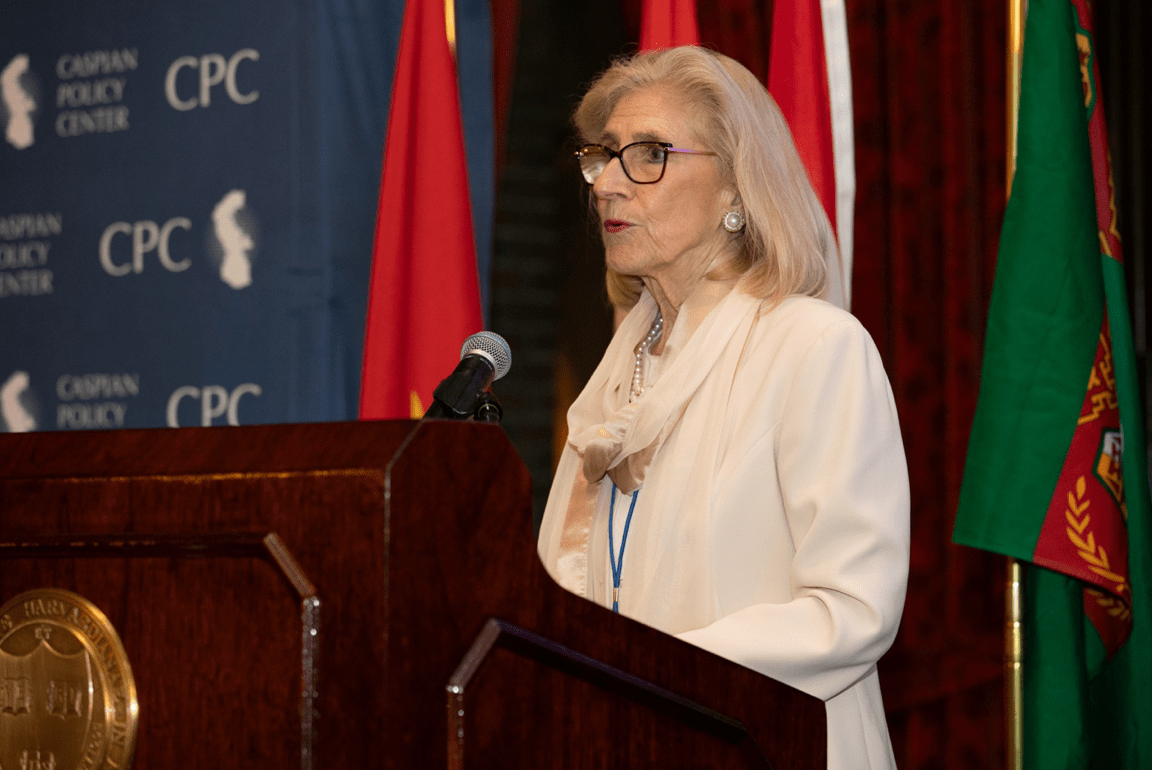
Photo of CPC Board Member Marsha McGraw Olive
Dr. McGraw Olive concluded the panel by emphasizing that the discussions held today underscored a strong alignment among all partners regarding the vision for the Middle Corridor. This shared understanding and commitment reflect a unified approach to advancing the corridor’s strategic goals, underscoring the importance of collaboration to achieve collective success.
A Q&A session concluded the forum, providing an opportunity for further discussion and collaboration among attendees. The fifth Caspian Business Forum underscored the importance of strategic partnerships and cooperative solutions to enhance connectivity, trade, and energy cooperation across the Middle Corridor, benefiting both the United States, the Caspian Region, and global supply chains.
In his closing remarks, Amb. (ret.) Hoagland noted that the eight countries of the South Caucasus and Central Asia increasingly work together as they form a region that the world powers now pay increasingly close attention to. What has also increased is the connectivity in and beyond the region as these nations work to benefit from the world powers while keeping their relations with them relatively balanced. This is a remarkable achievement in a relatively short time. Hoagland thanked Caspian Policy Center CEO Efgan Nifti and the entire CPC team for having put together one more successful Caspian Business Forum. He told the guests that we look forward to seeing them next year.
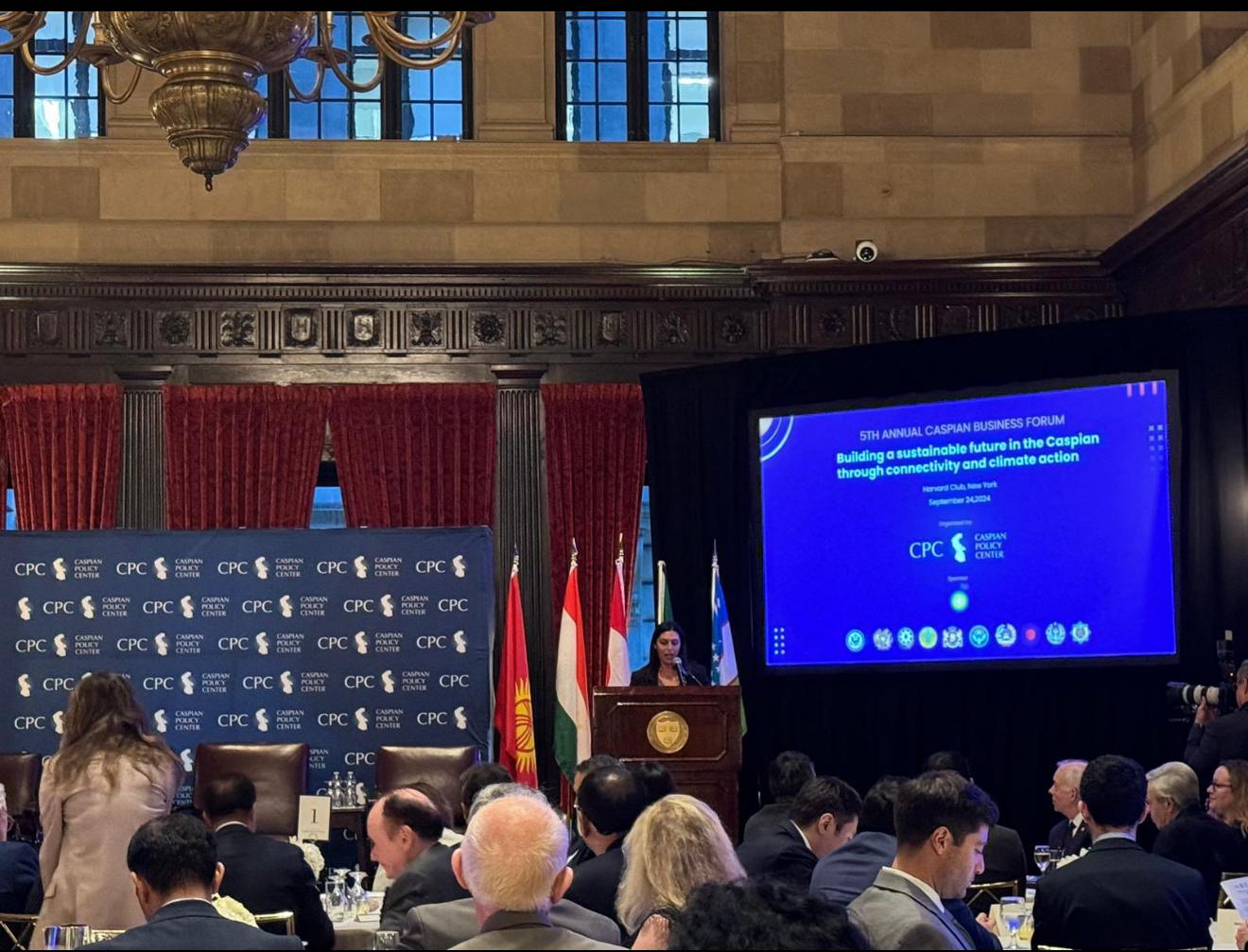
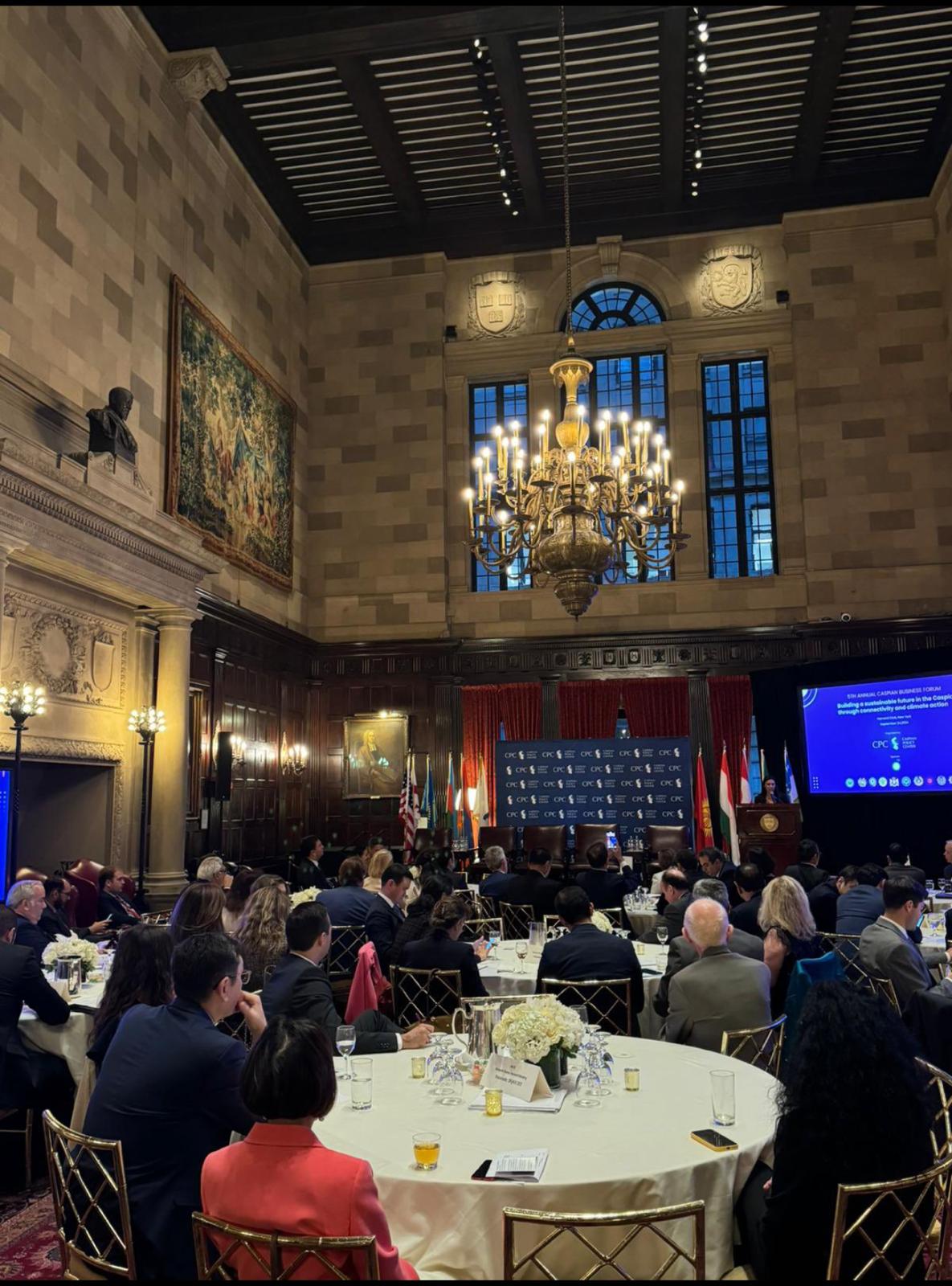
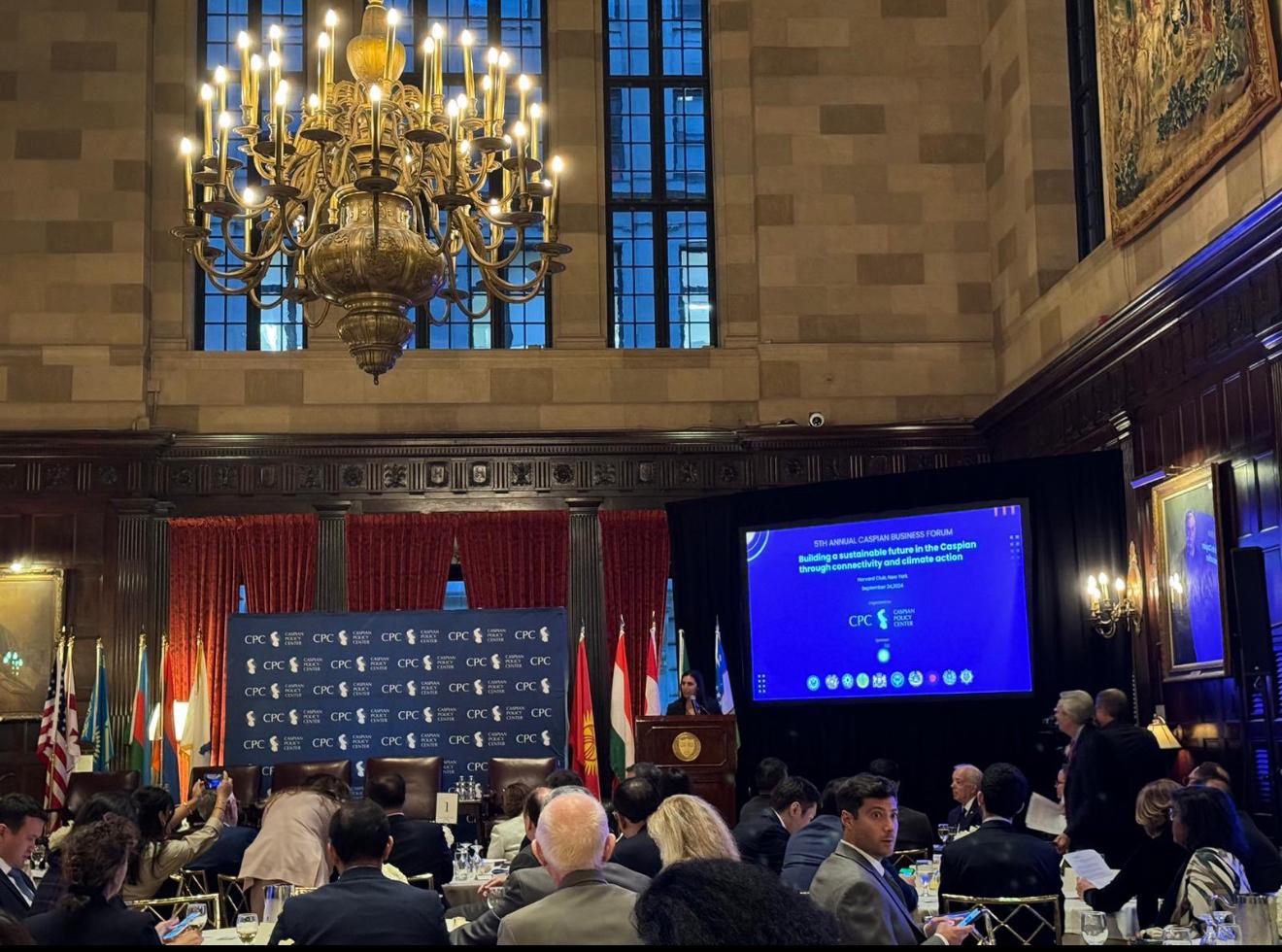
Watch the event